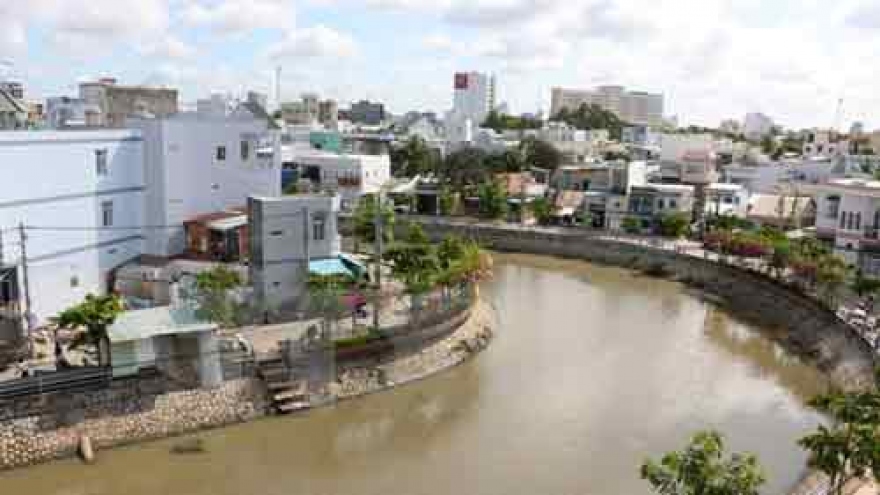Government highlights waterway safety
Management activities on inland waterway transport should be further enhanced to ensure traffic safety.
 |
According to the Government, the number of accidents on waterways has increased dramatically with last year’s number up by 21.7 percent and deaths up by 20.34 percent compared to previous years.
Even in the first half of this year, several accidents have occurred on transport routes causing deaths and loss of property.
Serious accidents
Just two days ago, a 500-tonne barge sank after colliding into the 100m Rach Dia Bridge while travelling on Rach Dia River in Nha Be District in HCM City.
The accident caused damage to the 40-year-old Rach Dia metal bridge which links Nha Be District and District 7 on Le Van Luong Street.
The barge, carrying 500 tonnes of sand, was owned by Pham Van Tam from Long An Province. After entering Rach Dia, the barge suffered engine failure and drifted into the bridge, sinking 30 minutes after the collision.
Earlier this week, a waterway accident occurred when two boats travelling in the same direction on the Hong (Red) River in Hong Ly Commune of Thai Binh Province collided, causing one boat to sink and killing three members of the same family.
Tran Van Tuan, captain of the sinking NB2434 vessel, his wife, Tran Thi Hai, and the couple’s two-year-old daughter were found dead after the incident whilst their eight-year-old son remains missing.
Within two weeks, from March 6 to 20, the country witnessed three waterway accidents. Of those incidents, affecting An Thai Bridge in Hai Dương Province, Con Do Bridge in Ha Tinh Province, and Ghenh Bridge in Dong Nai Province, the latest and most serious is the collapse of the 113-year-old Ghenh Bridge – the key link on the north-south rail route. It is important to note that all of the accidents were reportedly caused by neglect and the poor professional skills of sailors.
Safety neglect, poor management
The main reason given for the increase of accidents was irresponsible management by the vehicles’ owners, the instruction pointed out. Many vehicles were found not to meet safety standards and boat captains were not qualified to operate the vehicles.
Besides, illegal sand and soil exploitation, which has changed the water current and eroded riverbanks, was also a factor in the increased number of accidents.
Waterway traffic remains congested because of poor movement of vessels and boats through ferry stations and river routes, according to an inland waterway transport management agency.
The stations had no wharfs to help passengers board the vessels safely, which was the most serious concern.
To reduce the number of waterway accidents and protect infrastructure works on rivers and coastal areas, the PM has asked the Ministry of Transport to cooperate with relevant offices and local authorities to further tighten management on the transport route.
The Government also asked relevant agencies to stay in touch with and share information on violations with the local inland waterways administrations and registry departments for more efficient management.
The traffic police have to enhance inspections to check and penalise drivers of unregistered waterway vehicles, overloaded vehicles and those that do not comply with technical safety specifications. Drivers who do not have the proper qualifications will also be fined.
Inspections will be stepped up on vehicles transporting building materials including stones, sand and gravel.
Under the PM’s instruction, an overall check on the quality of transport vehicles and the qualifications of crew members and conductors needed to be carried out and completed by 2017.
The Ministry of Public Security was ordered to increase patrols on inland waterways, and to hand out stiff punishments to those found flaunting waterway regulations.
The traffic police was asked to carry our regular patrols and examination of boats to discover violations such as overloading boats, and lacking life jackets for passengers.
The PM also required the Ministry of Transport to carry out a thorough safety examination of all companies involved within water transportation nationwide.
The local authorities have to close illegal wharfs and other works on rivers which have threatened safety of inland waterway transport corridors.
The People’s committees were told to disseminate information on the waterway regulations, in order to enhance public safety awareness for all people who travel by boat within nationwide.
The Prime Minister also asked the National Committee for Search and Rescue to work with localities to speed up the co-ordination and implementation of rescue missions in the event of further accidents.



